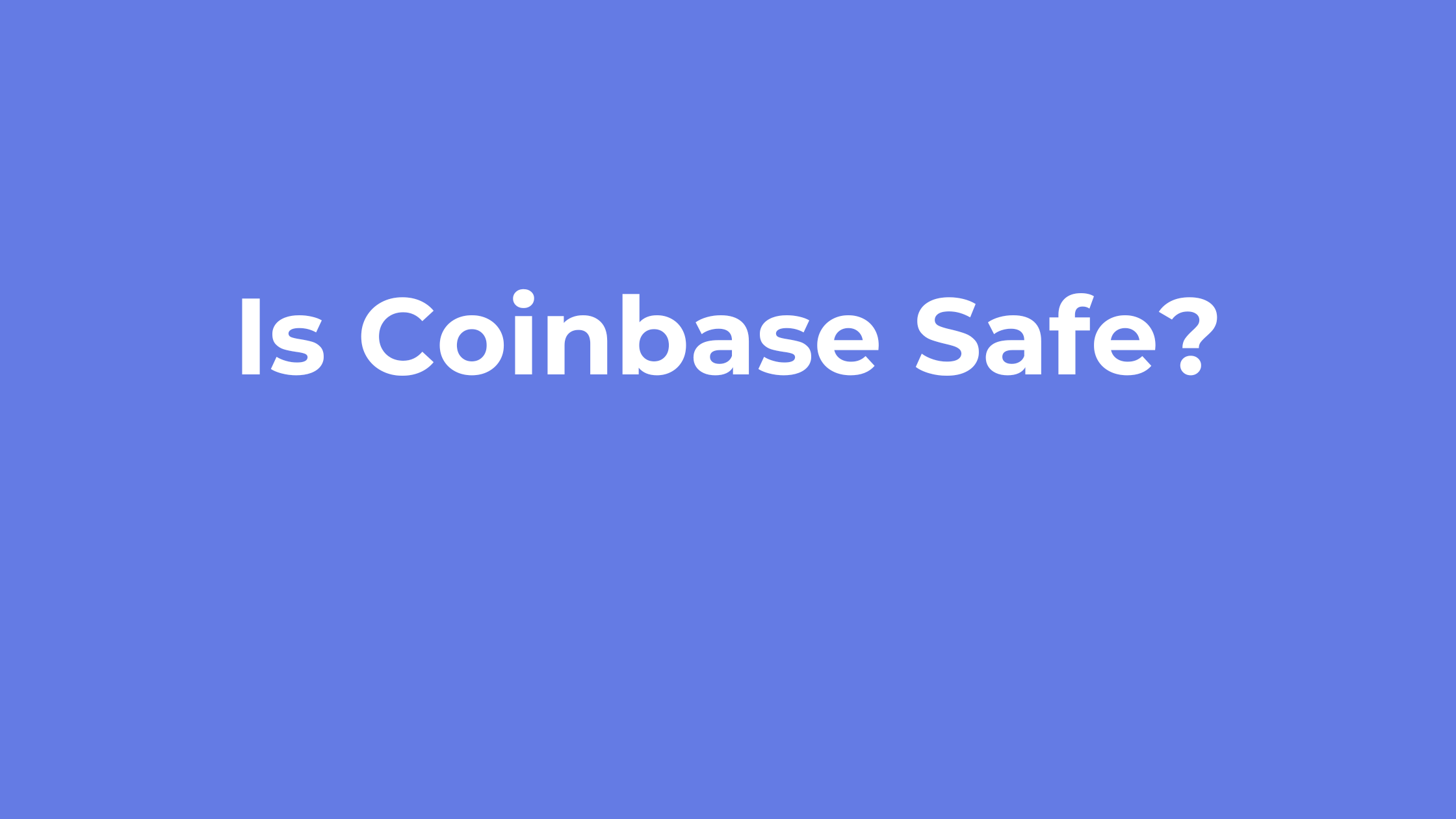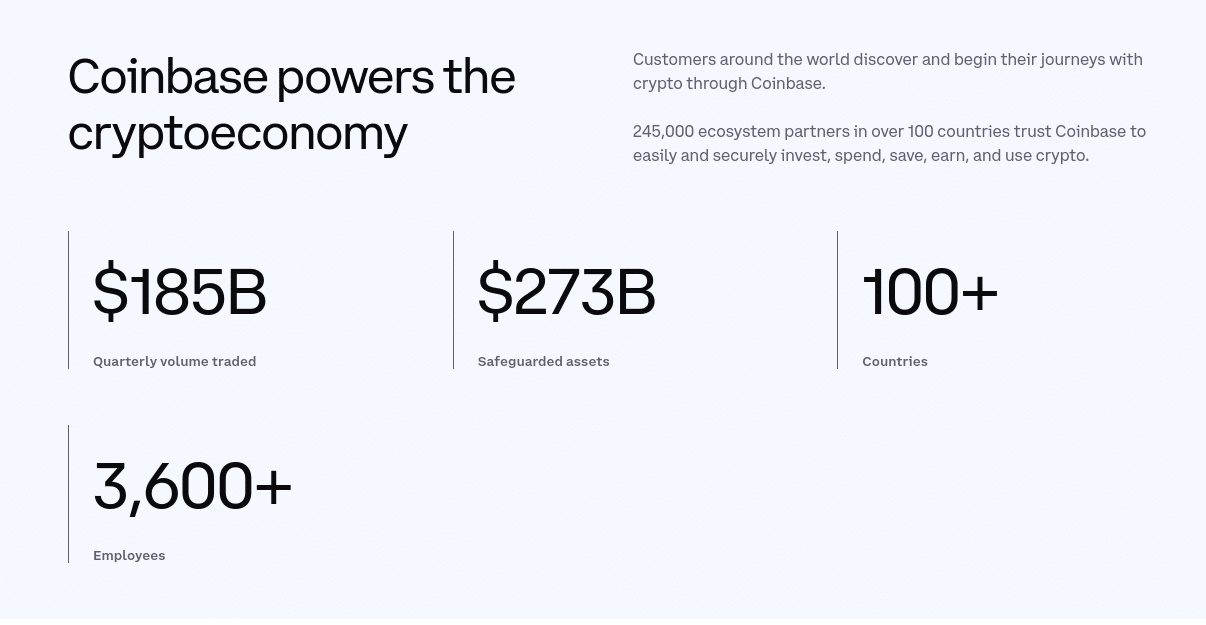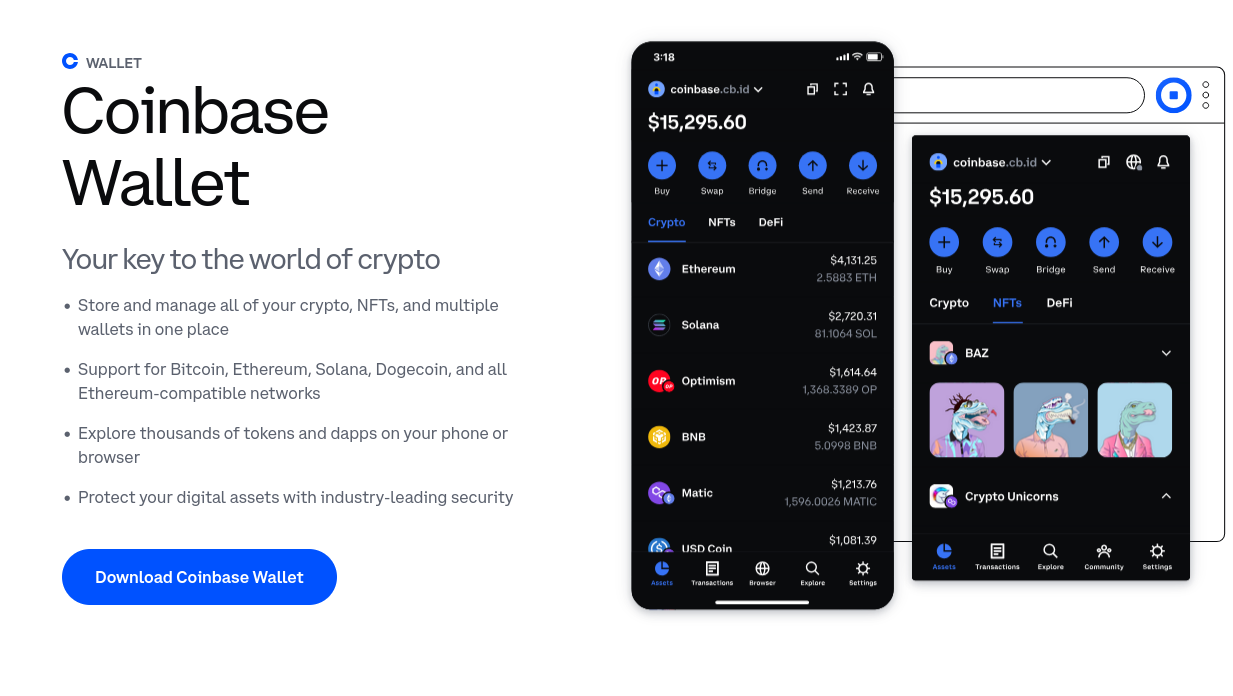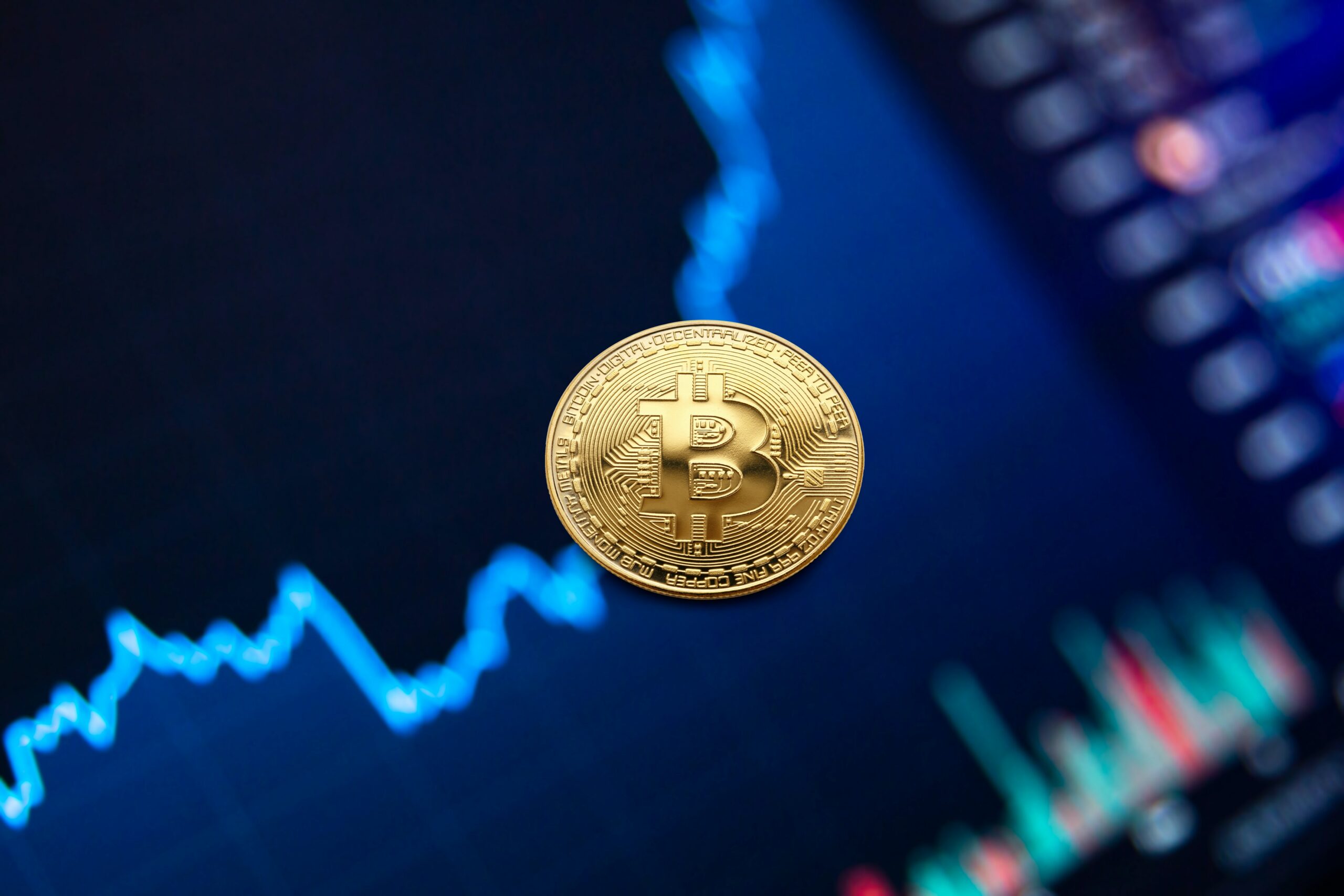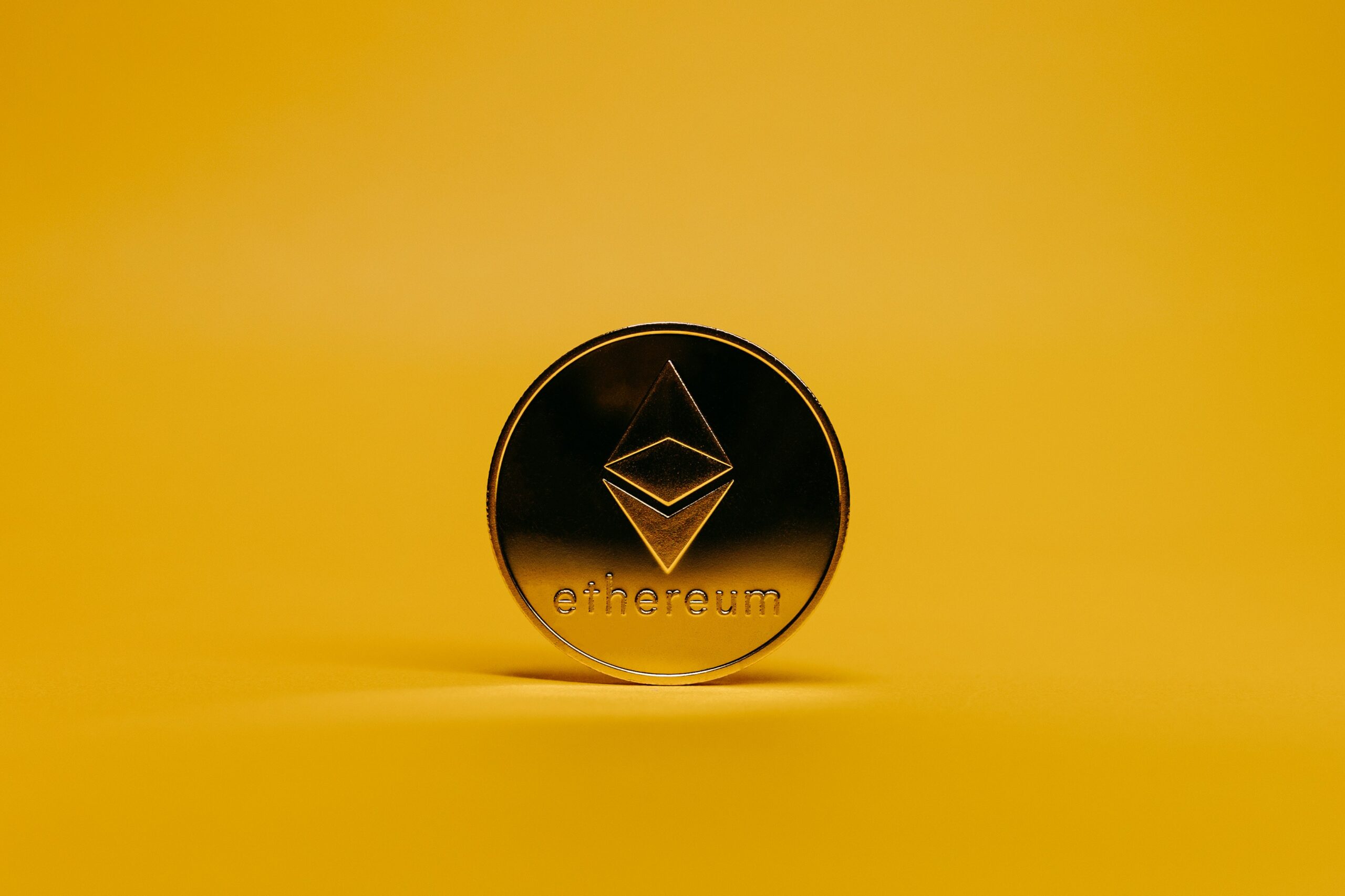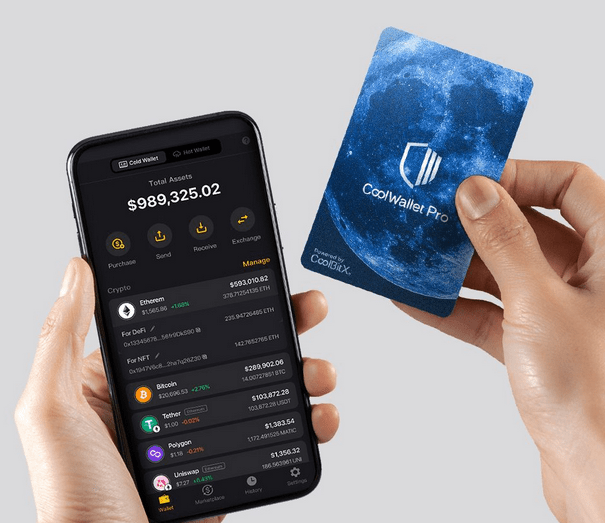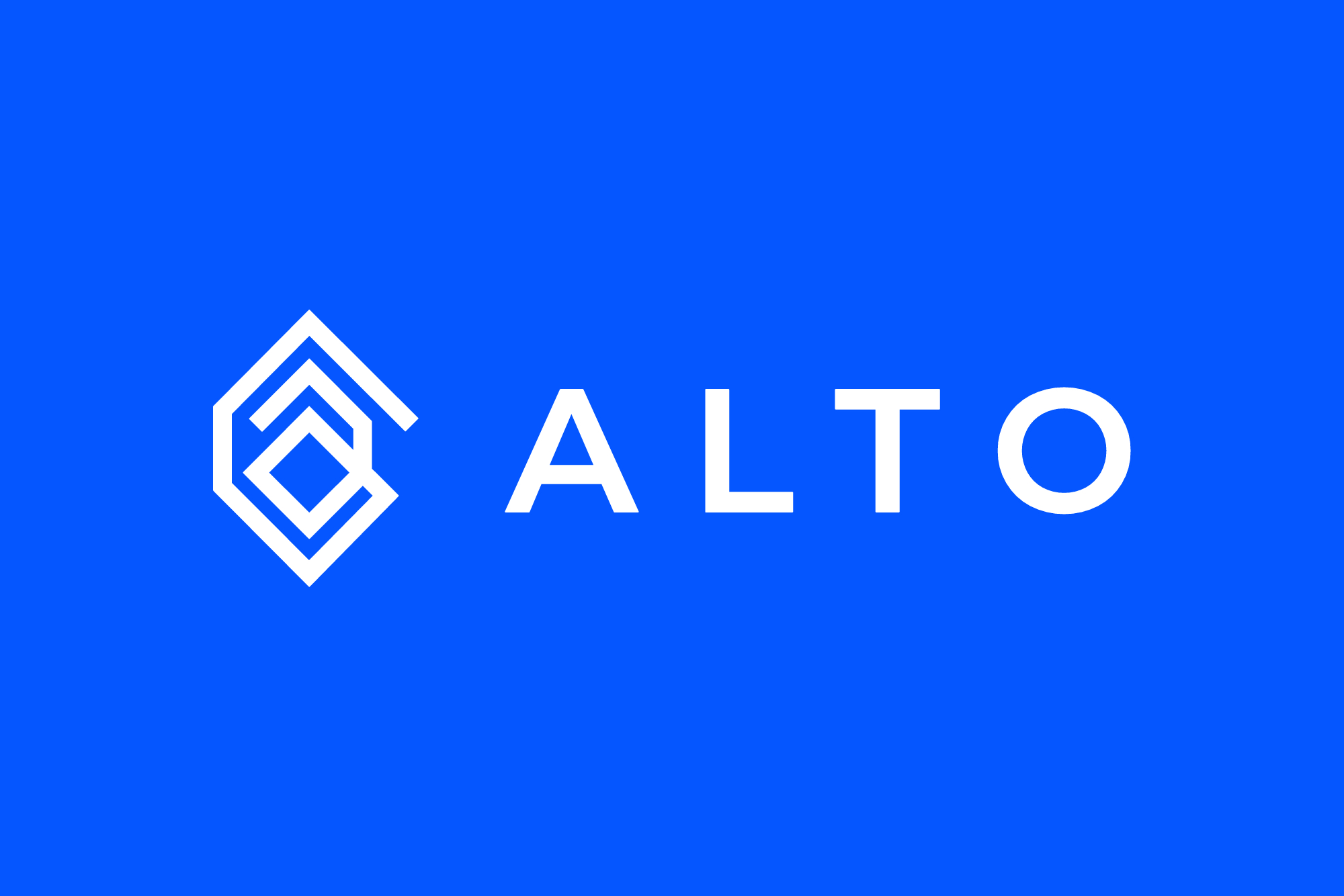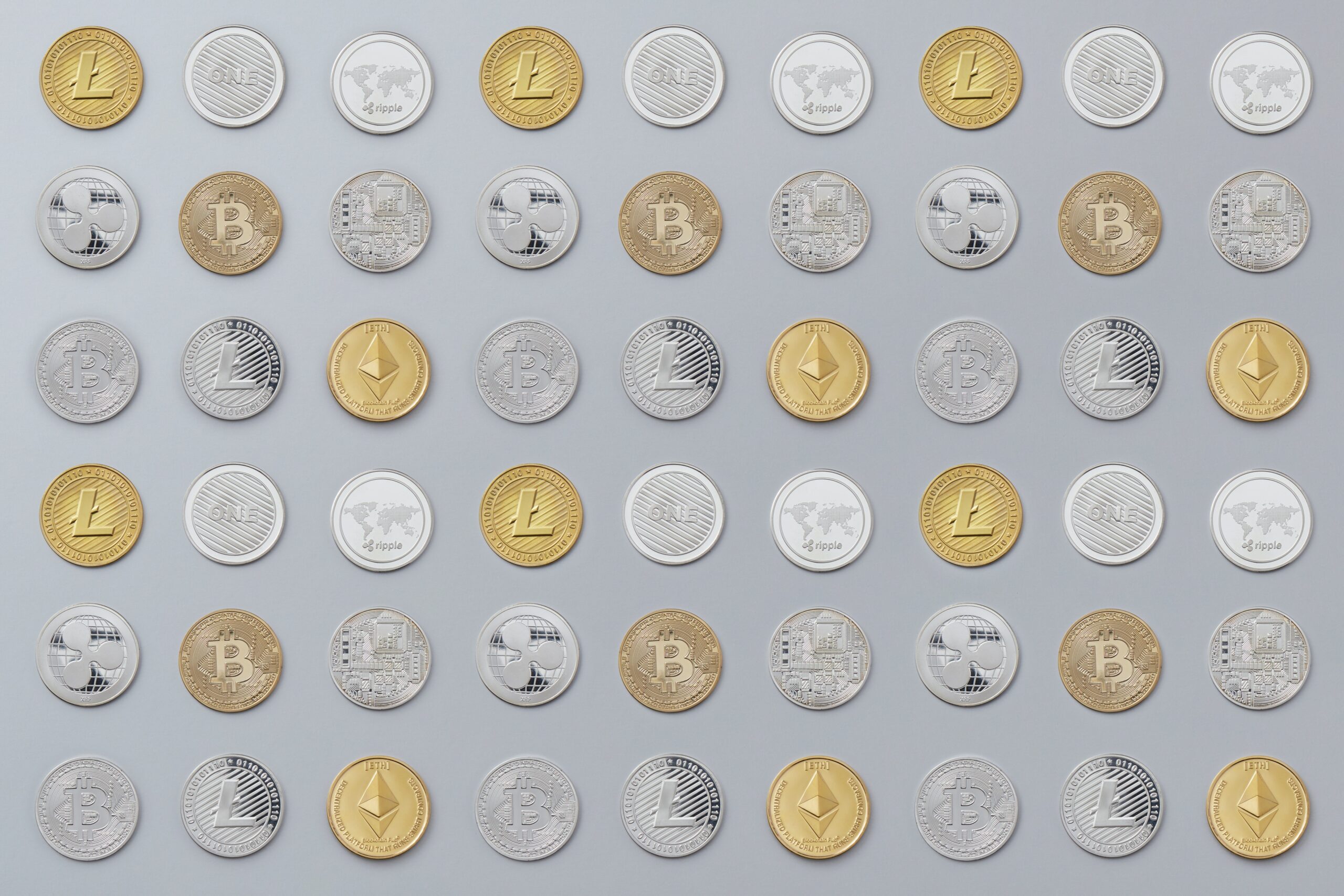Investing in crypto is inherently risky, but there are a lot of things you can do to mitigate your risk. The most important thing to do to avoid crypto scams and fraud is to only buy and sell through reliable, trustworthy platforms. That’s all well and good, but how do you know which platforms you can trust?
Coinbase is one of the biggest names in crypto. But before you put money on the platform, it’s prudent to do a little research: Is Coinbase safe? Is Coinbase Wallet safe?
In this article, I answer these questions and more with a detailed overview of Coinbase’s offerings, including its security and safety features.
Is Coinbase Safe?
Coinbase is generally considered one of the safest and most trusted cryptocurrency exchanges around.
Here’s a point in favor of its legitimacy: Coinbase is a publicly traded U.S. company, so it’s subject to strict regulatory oversight and must meet stringent security standards to continue operating.
The platform has a strong track record of protecting user funds and has never experienced a major security breach that jeopardized its customer’s assets.
While having a strong track record of security is important, it doesn’t mean that Coinbase is risk-free. But before we get ahead of ourselves, I want to take a small step back and explain what Coinbase is and how it works.
Sign up for Coinbase and get up to $200 in crypto. Terms Apply.
What is Coinbase?
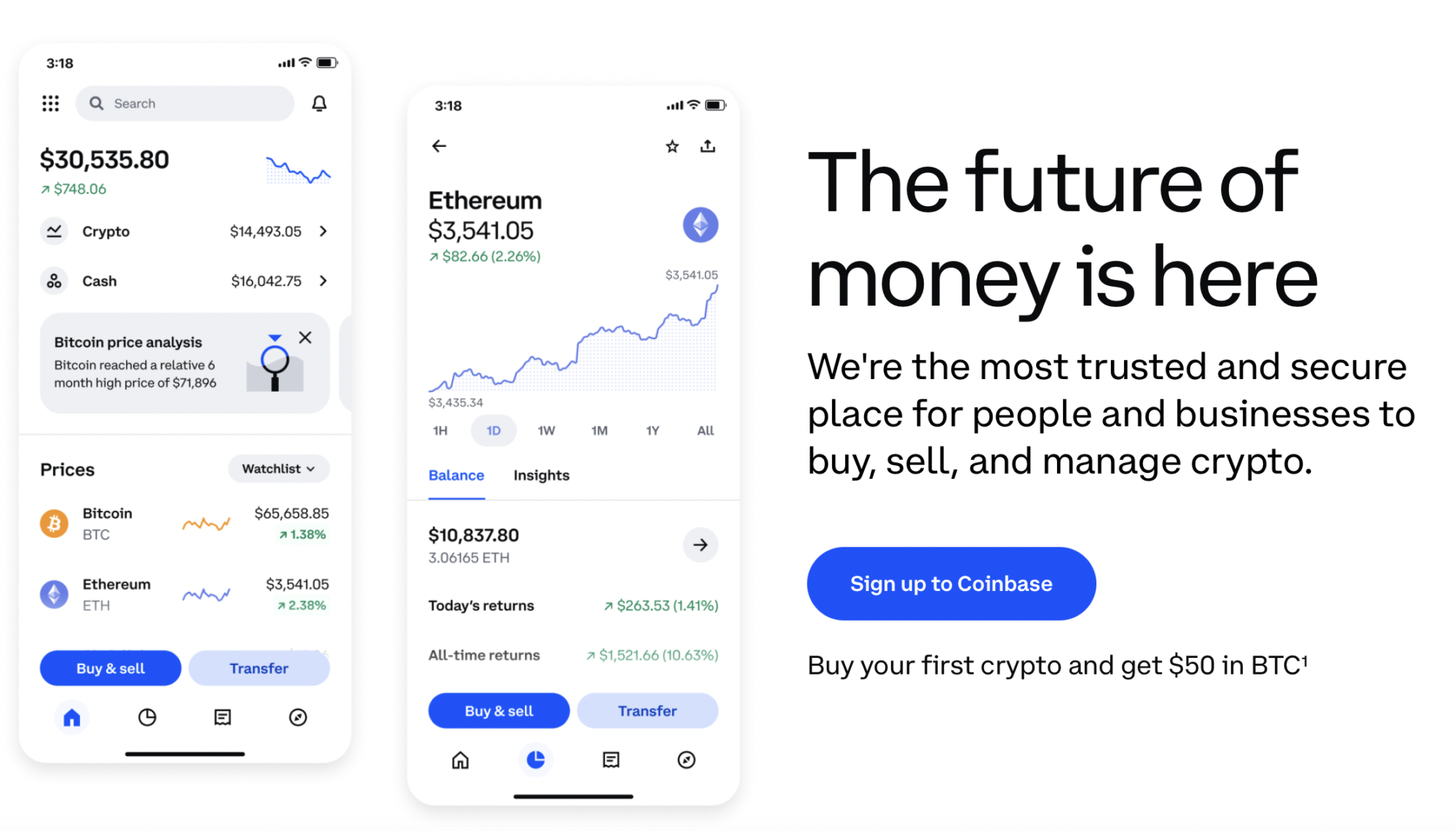
Coinbase is a digital currency exchange that allows users to buy, sell, and store cryptocurrencies like Bitcoin, Ethereum, Litecoin, and a host of other less well-known coins that you may or may not want to get involved with — I’m looking at you, Dogecoin.
Since its 2012 founding by Brian Armstrong and Fred Ehrsam, it has grown to become the largest and most popular crypto exchange in the United States … and one of the largest and most popular exchanges in the world. It is currently available in more than 100 countries and has over 100 million users worldwide.
Why is Coinbase so popular? Because it makes trading crypto simple. The platform offers a user-friendly interface that’s immediately familiar to anyone who has used a traditional brokerage platform to invest in stocks or ETFs.
Some of Coinbase’s most notable features include:
- Coinbase Wallet: A self-custody wallet that allows you to store, send, and receive cryptocurrencies without the hassle of other crypto wallets.
- Coinbase Pro: An advanced trading platform with lower fees and more features aimed at power users who have more trading experience.
- Coinbase Card: A debit card that allows you to spend your cryptocurrency anywhere that accepts Visa.
- Coinbase Earn: An educational program that rewards users with free crypto for completing courses and learning about how cryptocurrencies work.
Coinbase is designed to be a crypto platform for everyone. It focuses on making crypto easier to understand and more accessible, which makes it the best choice for crypto beginners.
It also offers more advanced features for experienced investors who don’t need as much hand-holding, so the platform can grow with you as you gain experience.
Sign up for Coinbase and get up to $200 in crypto. Terms Apply.
Coinbase Security Features: Is it Safe?
So, is Coinbase safe? Relative to the crypto industry at large, I’d say yes. Coinbase uses a comprehensive set of security measures to protect your accounts and funds.
How Coinbase Protects Customers
The following list explains the main features of Coinbase that make it one of the world’s safest and most trusted crypto platforms.
- Regulatory Compliance: As a publicly traded company, Coinbase is beholden to intense regulatory scrutiny and must adhere to strict reporting guidelines set by the Security and Exchange Commission (SEC). This transparency helps ensure that Coinbase operates in a trustworthy manner and holds it accountable for its policies and actions.
- Encryption: Coinbase uses AES-256 encryption to protect your data and ensure that your transactions are not readable by any outside parties. AES-256 is the industry standard for communicating securely over the internet.
- Two-Factor Authentication (2FA): Coinbase requires you to use 2FA, which makes it harder for people to steal your password and log in to your account. Two-factor authentication requires you to provide a code to log in. That code is either sent as a text message or through an authenticator app like Google Authenticator. Even if someone steals your account password, they won’t be able to log in without the 2FA code, which they won’t be able to get unless they have access to your phone.
- Mostly Cold Storage: The vast majority of user funds are stored offline in cold storage wallets, which are not connected to the internet at all. Funds kept in cold storage are literally untouchable since they can’t be accessed without physically accessing the device itself.
- Multisig Technology: Coinbase’s cold storage wallets also use something called multi-signature technology (multisig for short), which requires multiple private access keys to authorize transactions. This makes it much more difficult for bad actors to steal funds since they need to break through multiple layers of security to trigger a transaction. You can think of it like having multiple passwords for an account. Even if someone steals one of the passwords, they won’t get anywhere without the other ones.
- Biometric security: If you manage your Coinbase account via the company’s mobile app, you can use facial recognition or fingerprint authentication, which are far more secure than traditional passwords.
- Internal monitoring team: Coinbase also uses an internal team of security professionals to continuously monitor activity on its platform. The team uses cutting-edge tools like machine learning and AI to detect suspicious activity and handle it before it becomes a serious threat.
- Industry standard compliance: Coinbase is also compliant with the cryptocurrency industry’s compliance standards. The company adheres to Know Your Customer (KYC) and anti-money laundering (AML) regulations, both of which serve to prevent fraud.
- Digital asset insurance: The company also has digital asset insurance for all of the assets it holds. This insurance helps protect against losses due to security breaches. Coinbase also provides FDIC insurance on U.S. dollar balances up to $250,000. These protections help mitigate your losses if Coinbase’s security measures manage to fail and are the same protections you’d get from traditional financial institutions like banks and credit unions.
- Incident response team: If something does go wrong, Coinbase has a response team on hand at all times, ready to respond to any fraudulent activity and reduce the impact of a breach. You will also be notified immediately if Coinbase thinks that you are personally affected by any security breaches or threats.
Is Coinbase Wallet Safe?
It’s good to know that Coinbase is safe, but is Coinbase Wallet safe? Before I can answer that satisfyingly, let me give you a brief overview of how Coinbase Wallet works.
Coinbase Wallet is a self-custody wallet, which means that you have full control over your private keys and funds that you store in the wallet. Having full control over your Coinbase Wallet makes it more secure and private, but it also puts the responsibility for securing funds on you.
If you lose your private keys or fall victim to a scam, Coinbase is not responsible and cannot help you recover your losses.
Even though Coinbase isn’t responsible if you misplace your private keys or mismanage your Coinbase Wallet, the company still provides features to help you manage your wallet:
- Secure Element chip: Coinbase Wallet uses a Secure Element chip to store your private keys, which is more secure than other key storage methods and is less susceptible to common attacks.
- Biometric authentication: You can enable Face ID or Touch ID to restrict access to your Coinbase Wallet, which makes it much harder for outside parties to access your wallet.
- Backup and recovery options: Coinbase Wallet lets you back up your wallet using a 12-word recovery phrase. You can use this phrase to recover access to your wallet if you lose whatever device you use to manage your wallet.
The important thing to remember is that while Coinbase Wallet helps you keep your crypto secure, the burden ultimately falls on you to manage your tokens safely and securely.
Sign up for Coinbase and get up to $200 in crypto. Terms Apply.
Coinbase: The Risks
Even though Coinbase is one of the safest cryptocurrency exchanges, there are still some risks associated with using it that you need to be aware of before you open an account.
Crypto Market Risk
Investing in cryptocurrencies is inherently risky due to the natural price fluctuations that happen in any market. The caveat is that even stable cryptocurrencies like Bitcoin and Ethereum are far more volatile than even the wildest stocks and commodities.
Market risk is not something specific to Coinbase but is an important part of the overall risk of using the platform.
Liquidity
Liquidity risk is also not unique to Coinbase. In times of high market volatility, such as bull runs or crashes, you might not be able to withdraw your funds when you want to due to the heavy traffic on the platform.
Coinbase aims to provide you with fast access to your funds at all times, but it’s possible to sustain losses while you wait for your orders to process.
Tips to Be Safe on Coinbase
Before I wrap up, I want to leave you with some tips for using Coinbase safely.
- Have a strong password: Use a unique, complex password for your Coinbase account and don’t reuse a password that you use for any other online account.
- Use 2-factor authentication: Make sure you enable 2FA for your Coinbase account as soon as you sign up.
- Don’t ignore updates!: Keep the device you use to access your Coinbase account up to date at all times. Delaying software updates can leave you vulnerable to attacks since you want to have the latest security patches on your device.
- Keep your seed phrase safe: Never EVER store your 12-word recovery seed phrase online and never share it with anyone.
- Be careful what you post: Avoid sharing sensitive information about your Coinbase account or your crypto holdings online on public forums. Hackers and scammers can use this information to target you.
TL;DR
- Coinbase is one of the safest and most trusted crypto exchanges, with a strong track record of security and protecting user funds.
- The platform uses the latest best practices in security, including encryption, 2FA, cold storage, and insurance.
- Despite having strong security, using Coinbase inherently comes with risks. Managing your risk is about following the best practices and being aware of potential losses from market risk and liquidity risk.
Prefer to invest in more than just crypto?
If you’re interested in crypto but want to trade other assets too, we recommend eToro.
eToro offers access to a limited selection of crypto, as well as stocks, ETFs, and other assets.
There’s a reason why eToro has over 30 million fans — it’s easy to use, it offers customizable watchlists, technical analysis tools, and a range of educational resources can each make you a better trader.
It also offers unique features like CopyTrader, which lets you follow and copy the trades of more established traders. It’s a great way to gain insight into the mechanics of trades, and can help you learn about the stock market in an active way.
eToro is a multi-asset platform which offers both investing in stocks and cryptoassets, as well as trading CFDs. Please note that CFDs are complex instruments and come with a high risk of losing money rapidly due to leverage. 61% of retail investor accounts lose money when trading CFDs with this provider. You should consider whether you understand how CFDs work, and whether you can afford to take the high risk of losing your money. This communication is intended for information and educational purposes only and should not be considered investment advice or investment recommendation. Past performance is not an indication of future results. Copy Trading does not amount to investment advice. The value of your investments may go up or down. Your capital is at risk. Cryptoasset investing is highly volatile and unregulated in some EU countries. No consumer protection. Tax on profits may apply. Don’t invest unless you’re prepared to lose all the money you invest. This is a high-risk investment and you should not expect to be protected if something goes wrong. Take 2 mins to learn more eToro USA LLC does not offer CFDs and makes no representation and assumes no liability as to the accuracy or completeness of the content of this publication, which has been prepared by our partner utilizing publicly available non-entity specific information about eToro.
Final Word:
How safe is Coinbase? Coinbase is safer than most crypto exchanges, but that doesn’t mean it’s risk-free. It offers the most robust security of any crypto exchange and is a good choice for beginners and experienced traders alike.
There are no guarantees in crypto, but using Coinbase goes a long way to helping you avoid most of the common security issues that plague the crypto industry as a whole.
Sign up for Coinbase and get up to $200 in crypto. Terms Apply.
FAQs:
Can you trust Coinbase?
Yes, Coinbase is a trusted and secure platform for buying, selling, and storing cryptocurrencies. As a publicly traded company, Coinbase is subject to strict regulatory oversight and has a strong track record of protecting user funds.
What is the downside of Coinbase?
Some potential downsides of Coinbase include relatively high fees compared to other exchanges, occasional downtime during periods of high traffic, and limited customer support options.
Is it safe to keep my money in Coinbase?
Yes, it is generally safe to keep your money in Coinbase. The platform employs a range of security measures to protect user funds, including encryption, cold storage, and insurance.
However, it's essential to follow best practices, such as enabling 2FA and using a strong password, to further secure your account.
What is the risk of Coinbase?
The main risks associated with using Coinbase are market volatility and liquidity issues. Cryptocurrencies are inherently volatile, and their value can fluctuate significantly in a short period of time.
Additionally, during times of high market activity, users may experience difficulties withdrawing their funds due to increased demand on the platform.
However, these risks are not unique to Coinbase and are present when investing in cryptocurrencies on any exchange.
Where to Invest $1,000 Right Now?
Did you know that stocks rated as "Buy" by the Top Analysts in WallStreetZen's database beat the S&P500 by 98.4% last year?
Our July report reveals the 3 "Strong Buy" stocks that market-beating analysts predict will outperform over the next year.
